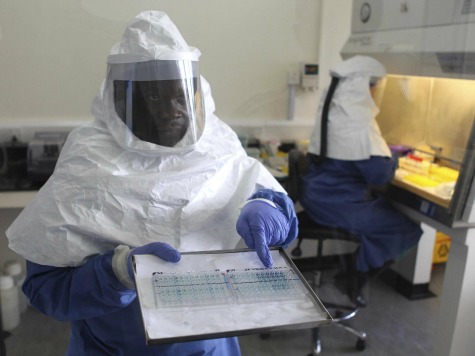
Thus far, 1,201 people have been infected with the Ebola virus in Africa. Of that number, 672 have died, making this outbreak the largest one in history. American officials estimate that this outbreak will last all the way into October, killing several hundred more.
One major problem is that authorities are not sure how many people are infected, as many are afraid to come forward. Therefore, ignorance is helping spread the disease.
For instance, many West Africans are afraid of foreign doctors, and rumors have spread that it is foreign doctors who are spreading the disease. This has prevented many people from going to hospitals to report their symptoms.
Ebola is spread by contact with the bodily fluids of an infected person (or animal). Blood, saliva, even sweat can transmit the virus. One man reportedly died from the disease after stealing an infected man’s cell phone. It kills upwards of 60 percent or more of those infected. By comparison, the Black Death kills 11 percent of those infected.
Another problem is the tradition of family members washing and handling the bodies of dead loved ones. These traditions can still spread the disease.
Authorities are stepping up information campaigns in hopes of breaking through the ignorance. In one effort, the country of Liberia has suspended FIFA soccer games in order to keep players from contracting the disease on the field and to raise public awareness.
Three Americans have contracted the virus.
Patrick Sawyer, 40, a naturalized American citizen who was working for the Liberian Ministry of Finance, collapsed and died on a visit to Lagos, Nigeria, on July 25.
Another American, Dr. Kent Brantly, a 33-year-old Indianapolis resident working as a doctor in Monrovia, has become also infected with the virus. Additionally, Nancy Writebol from Charlotte, North Carolina, became infected working as a nurse in the same facility.
Dr. Brantly’s family – all of whom are back in the U.S. – had only left Africa days before he became symptomatic. Authorities say the chances that the family is infected are remote, but they are being closely monitored just in case.
Officials at the Centers for Disease Control (CDC) say that chances that an outbreak of the virus could happen in the U.S. are remote.
In a Monday teleconference, CDC spokesperson Stephan Monroe, Ph.D., the deputy director at the National Center for Emerging and Zoonotic Infectious Diseases, recently assured Americans, “No Ebola cases have been reported in the United States and the likelihood of this outbreak spreading outside of West Africa is very low, I want to underscore that Ebola poses little risk to the U.S. general population.”
Authorities also say that in the U.S. we have better medical facilities to contain an outbreak should one occur.
During the conference call, Dr. Marty Cetron, the director for Global Migration and Quarantine, explained the various travel alert levels – the CDC issued a level two warning this week.
“Level one,” Cetron said, “is a watch which is practice usual precautions around outbreaks. Level two is an alert which is enhanced precautions. In this case, special recommendations either to populations at risk, such as health care workers or humanitarian aide workers or particular areas where the risk is high that goes beyond just a routine outbreak. Level three is a warning which is to avoid nonessential travel if you don’t have a reason to be there.”
France is more in danger of an outbreak than the U.S. because of the stream of immigrants it receives from western Africa, most especially the country of Guinea where the outbreak began in February.
Unfortunately, cases of Ebola have leapt outside the small corner of western Africa where the outbreaks first started. The countries of Guinea, Sierra Leone, and Liberia have lost hundreds of citizens, but outbreaks have also occurred in Cote D’Ivoire, Sudan, Gabon, Congo, The Democratic Republic of the Congo, Uganda, and even South Africa.
Follow Warner Todd Huston on Twitter @warnerthuston or email the author at igcolonel@hotmail.com.

COMMENTS
Please let us know if you're having issues with commenting.